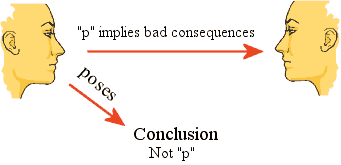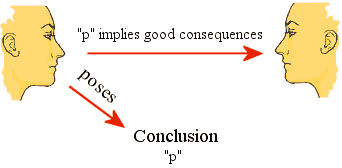|
An appeal to fear (or to terror) is a fallacy in which a person attempts to create support for an idea by using deception and propaganda in an attempt to increase fear and prejudice toward an opposing idea. Appeals to fear are widespread in politics.
The general pattern of this form of "reasoning" is as follows:
Either p or q is true.
Q is frightening
Therefore, p is true.
The ploy of using scare tactics is quite common in government propaganda where the individual's liberties are called to be sacrificed for the sake of a supposed greater good. Variations of the pattern always involve forms of distraction and emotional appeals for saftey and/or security:
- X is true (or false) because if people did not accept X as being true (or false) then there would be negative consequences.

Conversely,
- X is true (or false) because accepting that X is true (or false) has positive consequences (This is also known as "Wishful Thinking").

This line of "reasoning" is fallacious because the consequences of a belief have no bearing on whether the actual belief is true or false.
For example, if someone were to say "If sixteen-headed purple unicorns don't exist, then I would be miserable, so they must exist" it would be clear that this would not be a good line of reasoning. It is important to note that the consequences in question are the consequences that stem from the belief.
It is important to distinguish between a rational reason to believe (RRB) (evidence) and a prudential reason to believe (PRB) (motivation).
- A RRB is evidence that objectively and logically supports the claim.
- A PRB is a reason to accept the belief because of some external factor (such as fear, a threat, or a benefit or harm that may stem from the belief) that is relevant to what a person values (or what motivates the belief) but is not relevant to the truth or falsity of the claim.
The nature of the fallacy is especially clear in the case of Wishful Thinking. Obviously, merely wishing that something is true does not make it true. This fallacy differs from the Appeal to Belief fallacy in that the Appeal to Belief involves taking a claim that most people believe that X is true to be evidence for X being true.
Examples
- "Voting for him is the same as voting for the terrorists."
- "God must exist! If God did not exist, then all basis for morality would be lost and the world would be a horrible place!"
- "It can never happen to me. If I believed it could, I could never sleep soundly at night."
- "I don't think that there will be a nuclear war. If I believed that, I wouldn't be able to get up in the morning. I mean, how depressing."
- "I acknowledge that I have no argument for the existence of God. However, I have a great desire for God to exist and for there to be an afterlife. Therefore I accept that God exists."
|


